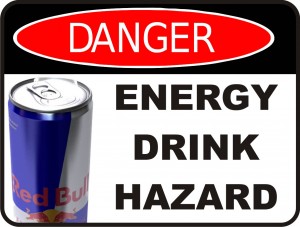Wake Up and Smell the Coffee
Do you recall the days in college that you would brew a pot of coffee to get through the occasional all nighter? Today, you have an endless supply of vices to curb that ‘energy fix’ we all crave. From Red Bull to Death Wish coffee (yes, that’s an actual brand), you can all get your fix for energy at a moments notice. The question you may be failing to ask yourself is “at what risk am I prepared to ingest these elixir’s?”
First of all, if you are reading this and are thinking, “I don’t ever drink energy drinks, I just drink coffee”, news flash, COFFEE is the number one energy drink on the market today. There are legalized dealers selling it on every corner. I do not say this to cast judgment, I enjoy my daily k-cup every morning. I state this only because ‘denial’ is not a river that flows through Egypt. The average energy drink has 80 mgs of caffeine compared to a venti Starbucks that has 415 mgs (we haven’t even added your sugar yet).
 So why doesn’t everyone just drink coffee if the caffeine is the magic stimulant? Because, it’s not. Manufactures make claims that drinking their products will ‘enhance your endurance and performance’, but any boost you get is mostly from the caffeine and the sugar. It is the combination of caffeine and sugar combined with other ‘nutrients’ such as taurine, ephedrine, ginseng, and b-vitamins (to name just a few) combined with the marketing power of the words “nutritional supplement” that attract so many into a false reality of actually creating new energy AND getting their Flintstone’s too.
So why doesn’t everyone just drink coffee if the caffeine is the magic stimulant? Because, it’s not. Manufactures make claims that drinking their products will ‘enhance your endurance and performance’, but any boost you get is mostly from the caffeine and the sugar. It is the combination of caffeine and sugar combined with other ‘nutrients’ such as taurine, ephedrine, ginseng, and b-vitamins (to name just a few) combined with the marketing power of the words “nutritional supplement” that attract so many into a false reality of actually creating new energy AND getting their Flintstone’s too.
Caffeine works by blocking the effects of adenosine, a brain chemical involved in sleep. When caffeine blocks adenosine, it causes neurons in the brain to fire. Thinking the body is in an emergency, the pituitary gland initiates the body’s “fight or flight” response by releasing adrenaline. This hormone makes the heart beat faster and the eyes dilate. It also causes the liver to release extra sugar into the bloodstream for energy. Caffeine affects the levels of dopamine, a chemical in the brain’s pleasure center. All of these physical responses make you feel as though you have more energy.
Is drinking coffee bad for you? Nope. Scientists can agree that less than 200 mgs/day is not only safe, but it could have potential benefits such as increased alertness, fighting off headaches, improve metabolism, great pre-workout boost and may even help to prevent Alzheimer’s and other diseases. Just keep in mind that we can get caffeine from more than just coffee. It is also found in teas, chocolates and sodas, so the milligrams can add up quickly.
When you consider that when you drink an “energy” drink, it either already has sugar in it or you are adding to it (coffee), you are ingesting about as much sugar as 5 or 6 Krispy Kreme donuts and upwards of 200 mgs of caffeine, all for a “high” that likely won’t last an hour, and a crash that will make you angrier than a kid who can’t go trick or treating, is it really worth the health risks involved? Are potential side effects such as seizures, diabetes, cardiac abnormalities and drastic behavioral changes worth the risk? Just because it’s legal, doesn’t make it safe, especially in young adolescents who are usually unaware of their own genetic health risks.
Fact! Our body does require additional support through appropriate supplementation, especially after the age of 25. However, there is a place for properly supplementing our natural energy storage when it has been depleted as well as a time to supplement correctly when we are in a time of recovery from intense training. This type of supplementation is not likely to be found next to the cigarette lighters and Slim Jims at the register of 7-11. This type of supplementation should be done at the cellular level and is addressed in the “Cheers…” article in this month’s newsletter. Next month we will unveil some exciting new products at the Boston Bodyworker. Until than, if you find yourself needing to spike your energy to power through the last part of a day, try going for a brisk 20 minute walk, dropping down and doing a few sets of push ups or even performing some random acts of kindness such as giving out a few hugs. These actions will naturally trigger your own neurochemistry and activate neurochemicals such as dopamine, norepinephrine, and endorphins, all endogenous to us and readily available when appropriately requested.
Last and certainly not least, get some sleep. The over-caffeinating of our society has led to an all time spike in our nations insomnia rates. Coincidence? No, it’s not your pillow, your bed, your husbands snoring, stress at work, stress at home, stress, stress, stress…. it’s likely the fact that you have altered your sleep cycles due to these synthesized spikes of energy. Lack of quality sleep will yield a depleted storage of energy to have at your daily disposal.
Start 2015 off the right way and get in touch with how your body can supply you with the right amount of energy to make this the most productive and healthy year to date.
